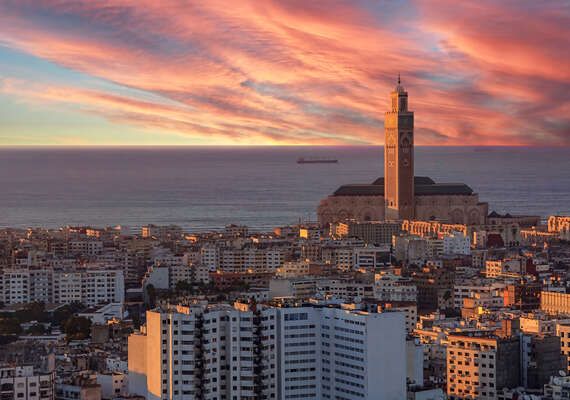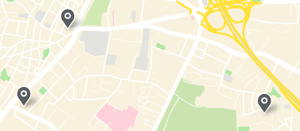Casablanca City Guide

| Country: | Morocco |
| Known Names: | |
| Language: | Arabic, French |
| Population: | Approx. 3.7 million |
| Religion: | Islam (most common) |
| Area Code: | +212 522 |
| Currency: | Moroccan Dirham (MAD) |
| Time Zone: | Western European Time (WET) - UTC/GMT +0 hours; Daylight saving: Western European Summer Time (WEST) +1 hour |
| Visa: | |
| Consulate: |
General Information / Guide
Casablanca, Morocco's largest city, serves as the main gateway to the country for many travelers. Its unique blend of Moorish architecture and modern development symbolizes Morocco's rapid modernization. The city is home to the Hassan II Mosque, with one of the world's tallest minarets, and a vibrant nightlife that showcases the cosmopolitan side of Moroccan life.
Climate / Weather / When to Go
Casablanca features a Mediterranean climate with mild, wet winters and warm, dry summers. Temperatures range from 8-25°C in winter to 18-28°C in summer. The best time to visit is from April to June and September to November when the weather is mild and enjoyable.
How to Get There
Mohammed V International Airport, serving Casablanca, is about 30 km from the city center, offering both direct and connecting international flights. Trains, taxis, and buses are available for transfers to the city, with train journeys to Casa-Port taking around 45 minutes.
Food / Restaurants / What to Eat and Drink
Casablanca's cuisine reflects a perfect blend of Moroccan and French culinary traditions, offering an array of flavors and dishes. The Old Medina is home to various eateries serving traditional Moroccan dishes like tagine and couscous. Rick’s Café, inspired by the movie "Casablanca," offers a taste of nostalgia along with international and Moroccan cuisine. For seafood lovers, La Sqala, set in a beautifully restored fortress, serves fresh catches alongside traditional Moroccan dishes. Moroccan mint tea is an essential part of any meal, perfectly complemented by pastries like baklava or the local favorite, cornes de gazelle.
Important Places / Places to Visit
- Hassan II Mosque: An architectural marvel with the world's tallest minaret, offering guided tours to appreciate its intricate design and oceanfront setting.
- Casablanca Corniche: A beachfront promenade lined with cafes, pools, and clubs, offering leisure and entertainment by the Atlantic Ocean.
- Morocco Mall: One of the largest shopping centers in Africa, including a vast array of shops, entertainment facilities, and an indoor aquarium.
- Mohammed V Square: A central hub of Casablanca's administrative buildings, showcasing colonial architecture and serving as a focal point for cultural events.
- Habous Quarter: A traditional neighborhood blending Moroccan and French colonial architecture, home to markets selling crafts, foods, and textiles.
- Ain Diab Beach: Known for its sandy shores and vibrant beach clubs, Ain Diab is a popular spot for sunbathing, swimming, and surfing.
What to Do
In Casablanca, visit the Hassan II Mosque, one of the largest mosques in the world, with incredible architecture. Walk along the Corniche for seaside views and cafes. Shop at Morocco Mall, one of Africa's biggest shopping centers. Explore the Old Medina for traditional markets and Moroccan crafts. Try Moroccan mint tea and local pastries for a taste of local flavors. Casablanca blends modern life with rich history and culture.
Nightlife / Bars / Entertainment
Casablanca is the heart of nightlife and entertainment in Morocco, boasting a lively and sophisticated scene that caters to all preferences. The city never sleeps, offering a plethora of options for anyone looking to dive into its vibrant night scene. While the Corniche area is known for its luxury lounges and nightclubs, there are plenty of other spots throughout the city that offer a fantastic night out without breaking the bank. Rick’s Café, inspired by the classic film "Casablanca," offers not just a nostalgic atmosphere but also live music and a selection of fine wines and spirits. For those looking to dance the night away, Sky 28 offers breathtaking panoramic views of the city along with a selection of the finest cocktails. Casablanca’s nightlife is a mix of traditional charm and modern luxury, making it a must-visit destination for anyone seeking entertainment after dark.
Shopping / What to Buy
Casablanca's shopping scene is a mix of traditional and modern. The Central Market is a great place to explore for fresh produce and local delicacies, while the Quartier Habous, or New Medina, offers a charming shopping experience with its traditional Moroccan crafts, including leather goods, ceramics, and textiles. Morocco Mall, one of the largest shopping centers in Africa, provides a luxury shopping experience with international brands and entertainment options. For those interested in fashion, Maarif and the Boulevard de la Corniche are lined with boutiques selling the latest trends. Casablanca combines traditional Moroccan culture with modern luxury in its shopping offerings.
Festivals/ Events
March: Casablanca Fashion Week
July: Casablanca Festival
August: Throne Day celebrations
Holidays / Festivals / Important Days
1 January: New Year's Day
11 January: Independence Manifesto Day
1 May: Labour Day
30 July: Throne Day
21 August: Oued Ed-Dahab Day
6 November: Independence Day
Eid Al-Fitr
Eid Al-Adha
Things to Pay Attention to / Important Information
Dress conservatively out of respect for local customs.
Learn basic French or Arabic phrases, as they're widely spoken.
Carry cash for smaller shops and markets.
Be vigilant with personal belongings in crowded places.
Respect Islamic customs and traditions.
Try local Moroccan cuisine but be cautious of street food hygiene.
Be prepared for bargaining in markets, as it's customary.
Understand that public displays of affection are frowned upon.
Transportation
In Casablanca, travelers can use trams, buses, taxis, and the train for city and intercity travel. The tramway is a modern and efficient way to traverse the city, with two lines connecting key areas. Buses offer wider coverage at a lower cost but can be crowded. Taxis, including petit taxis for city trips and grand taxis for longer distances, are abundant and negotiable. The train station offers connections to other major Moroccan cities.
